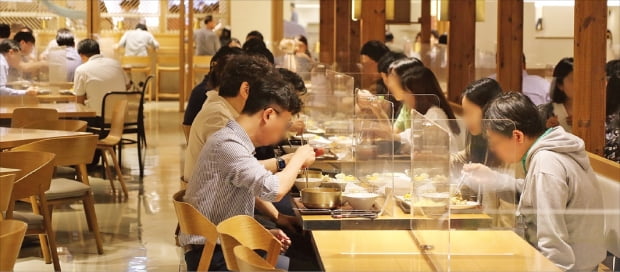
Employees are eating at the cafeteria of a company operated by the food service and foodstuff company CJ Freshway. The Fair Trade Commission announced on the 5th that eight major companies, including Samsung, Hyundai Motors, LG, Hyundai Heavy Industries, Shinsegae, CJ, LS, and Hyundai Department Store, have decided to open their cafeteria to the outside. Hankyung DB
The Fair Trade Commission’s measures to open the corporate food market are creating controversy. Although the cause of win-win is the cause, criticism has been raised that it is a tabletop administration that cannot be satisfied by any of the stakeholders, such as the catering companies, small and medium-sized businesses, and office workers who want quality meals. The controversy surrounding the opening of the corporate catering market was pointed out by issue.
After the decision to open the catering market of large corporations, complaints from employees are pouring into the bulletin boards of major companies. Various backlash continued from the criticism of “will the cafeteria be made into a hamba house (construction site restaurant)” to “is the Fair Trade Commission responsible for the meals”. Experts are also raising questions about the effect of’win-win’, the cause of the Fair Trade Commission. This is because few small and medium-sized enterprises can afford large-scale meals. It means that it is difficult to expect the effect of falling water.
○“Meals are in-house welfare… ”
“The late Hyundai Chairman Chung Ju-young asked,’Why should the company give the employees meals, why do they make their lunches cheaper?’ is the background for the birth of corporate group meals. It’s ridiculous to see catering, an employee welfare issue, as an insider deal.”
On the 6th, a company official who opened the right to operate the cafeteria to outside companies due to pressure from the Fair Trade Commission responded that “it is not understandable”. The official said, “In terms of employee welfare, we are providing high-quality meals through our catering affiliates. Suddenly, we have to entrust our employees’ meals to small and medium-sized enterprises.”
The response of employees of large corporations in Generation MZ (millennials + Generation Z), who are sensitive to welfare and treatment, is much more straightforward. On the anonymous bulletin board of a large company, reactions such as, “Is it trying to turn the cafeteria into a hamba house?”

○“Small and medium-sized businesses will be difficult to handle”
The biggest question is whether there are small and medium-sized businesses that will replace a quality diet right away. According to the industry, there are not many small and medium-sized enterprises that can afford to provide large-scale meals at the level of major catering companies. In the food service industry, 1000 meals is the standard for small and medium-sized companies. It means that if there are more than 1,000 people, it is difficult for small and medium-sized companies to handle the procurement and cooking of ingredients.
An official from a food service company said, “The SK Icheon Semiconductor Campus has more than 10,000 meals,” and “There is no small and medium-sized business that can supply 10,000 meals.” Another food service company official raised doubts about the effectiveness, saying, “If the catering bidding of a large company’s affiliates is opened, company B will eventually take the quantity supplied by company A, and company A will take the meals supplied by company B.”
Five companies, including Samsung Welstory, Our Home, Hyundai Green Food, CJ Freshway, and Shinsegae Food, that supply meals to affiliates of large corporations called by the government the day before have large-scale food supply chains and facilities. These companies have made large-scale investments for this, and through this, they have lowered unit prices and improved quality.
Despite large investments, the operating margins of these companies remain at 1~2%. It is because they are approaching meals as a’welfare business’ for employees rather than a’profitable business’. An official from one company said, “The most important factor to consider in bidding for meals is the diversity of menus and the competitiveness of dietitians rather than unit price.”
Some point out that not only the quality of meals but also the management of unexpected risks such as the problem of restaurant quarantine caused by the spread of Corona 19 may become even more difficult.
It is the position that the industry is misleading the facts in the opinion of the Fair Trade Commission that it is ‘to drive away relatives’. This is because all catering companies affiliated with conglomerates are affiliated with a group that has a normal equity investment relationship, except for Our Home.
KAIST Professor Lee Byung-tae, a professor of business administration at KAIST, criticized “The FTC is an institution that has to pursue consumer welfare and rights rather than regulation, but it has transformed into a regulatory agency for large corporations.”
Reporter Jeonju-ri/Hwang Jeong-su/Park Jong-gwan [email protected]
